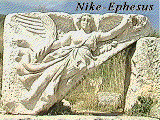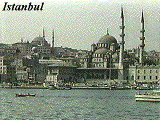|
|

Turkey is a great dusty bazaar that offers something to everyone. It has majestic
Byzantine cathedrals; luxurious Ottoman palaces and mosques; the classical ruins of
Ephesus, Troy and Pergamon; and the warm sun and beautiful beaches of the Black Sea and
the Mediterranean. It also has one of the world's great cities: Istanbul, now a sprawling
metropolis, was in previous lives the glorious capital of two empires.
Europe and Asia meet in Turkey, both physically and culturally. The continents are divided
by the Bosporus strait, which divides the country. European and Asian influences have
washed back and forth for . . .
Turkey is a great dusty bazaar that offers
something to everyone. It has majestic Byzantine cathedrals; luxurious Ottoman palaces and
mosques; the classical ruins of Ephesus, Troy and Pergamon; and the warm sun and beautiful
beaches of the Black Sea and the Mediterranean. It also has one of the world's great
cities: Istanbul, now a sprawling metropolis, was in previous lives the glorious capital
of two empires.
Europe and Asia meet in Turkey, both physically and culturally. The continents are divided
by the Bosporus strait, which divides the country. European and Asian influences have
washed back and forth for centuries, creating a mix that has its own dynamics -- an energy
and a tension that make Turkey a most fascinating destination. Don't rush a trip through
Turkey. It's best seen in leisurely drives along the coast, past places of remarkable
history and beauty.
Turkey is as diverse geographically as it is culturally: It contains rolling steppe
(Marmara), fertile plains (Aegean), volcanic peaks capped with snow (Central Anatolia) and
more than 5,000 mi/8,000 km of coastline (along the Black Sea and the Mediterranean).
Traveler's Advisory: We are really keeping our eye on Turkey following a
major offensive by the army against Kurdish rebels near the Iraq border. Kurdish
terrorists have been active in the country for the past few years, and we expect the new
offensive will only increase reprisals. Except for the Black Sea Coast, areas of eastern
Turkey are considered dangerous for visitors. Those heading for the eastern provinces
should obtain any necessary permits from the Turkish government and register with their
embassy. Everyone visiting the area should be advised that flying is safer than taking
ground transportation. In addition, there have been isolated terrorist attacks in Antalya,
Istanbul and the resort towns of Fethiye and Marmaris. Call the U.S. State Department
Citizen's Emergency Center (202-647-5225) or the Canadian Travel Advisory Line
(800-267-6788) for the latest advisories.
 The best time for touring is April-May
and September-October, when the day temperatures are most comfortable and the least amount
of rain falls. For the beach worshipper, June-September is best. There are seven basic
climatic areas: Marmara: temperate, warm and fairly humid summer days, cool nights, chilly
and rainy winters; Aegean: hotter and dryer than Marmara, but can be almost as cold in
winter; Mediterranean: hot and humid in summer, especially the eastern coast, mild but
rainy and coolish in winter; Central Anatolia: hot, dry summers, cold, rainy winters with
snow; Black Sea: high rainfall, most days overcast, mild and humid in summer, damp and
chilly in winter; Southeast Anatolia: very dry and very hot (100+ F/38+ C) in summer, mild
and dry in winter; and Eastern Anatolia: mild, short, dry summers, long and bitterly cold
winters with lots of snow. Do take a sweater for evenings year-round. The best time for touring is April-May
and September-October, when the day temperatures are most comfortable and the least amount
of rain falls. For the beach worshipper, June-September is best. There are seven basic
climatic areas: Marmara: temperate, warm and fairly humid summer days, cool nights, chilly
and rainy winters; Aegean: hotter and dryer than Marmara, but can be almost as cold in
winter; Mediterranean: hot and humid in summer, especially the eastern coast, mild but
rainy and coolish in winter; Central Anatolia: hot, dry summers, cold, rainy winters with
snow; Black Sea: high rainfall, most days overcast, mild and humid in summer, damp and
chilly in winter; Southeast Anatolia: very dry and very hot (100+ F/38+ C) in summer, mild
and dry in winter; and Eastern Anatolia: mild, short, dry summers, long and bitterly cold
winters with lots of snow. Do take a sweater for evenings year-round.
Agatha Christie wrote Murder on the
Orient Express in room 411 of the Pera Palas, Istanbul's landmark hotel. It is also
where she experienced her mysterious "lost" days, 11 days that neither she nor
anyone else can account for...Surprisingly enough, tulips come from Turkey. The blooms
were exported to Holland only in the 17th century...Tesekkur means "thank
you," nasilsiniz means "how do you do?" and ne kadar
means "how much?"...Pergamon is the birthplace of parchment, which was developed
after the ancient Egyptians stopped exporting papyrus (the word parchment is a corruption
of the Latin word pergamina, or "paper of Pergamon")...A novel
treatment for psoriasis can be obtained in the town of Kangal. Sufferers
sit in warm spring waters where fish nibble at affected areas. Amazing results have been
reported...
Florence Nightingale invented modern nursing in Istanbul during the Crimean War in 1854.
Her hospital barracks can still be visited...Hannibal, the invader of Italy, is buried in Gebze
(on the Sea of Marmara, southeast of Istanbul)...St. Paul and Barnabus sailed from Antalya
to Antioch to begin their first missionary voyage...The game bridge might have been
invented in Russia, but Europeans learned about it in Turkey. Now many people consider
Turkey its birthplace. Backgammon, called tavla, is also played
nationwide...Legend holds that the founders of Istanbul (ancient Byzantium) had been told
by a seer to settle across the water from the "city of the blind men." On one
side of the Golden Horn, the adventurers found a perfect site for a city; it had a good
water supply, excellent harbor and cooling breezes, but no one lived there. However, just
across the Straits was a town built on marshy ground that had no natural advantages.
Rightly deeming the others to be figuratively blind, the newcomers established
Byzantium...
It's possible that women traveling alone will be harassed. In general, women traveling in
Turkey should dress very conservatively (cover shoulders, arms and legs). A male traveling
companion is strongly advised...The Seven Churches of Asia Minor were in Ephesus,
Laodicea, Pergamon, Philadelphia, Sardes, Smyrna and Thyatira...There are more than 500
mosques in Istanbul...The clearest water for snorkeling is found around Antalya...Turkish
bathhouses, called hamam, are not coed. Men and women alternate times or have
separate houses. One we particularly enjoy, both because of the bath and the architecture,
is Cagaloglu in Istanbul... Good winter skiing is found near Bursa on Mt. Uludag...Most
museums are closed on Mondays...The word bey (for men) and hanim (for
women) follow a person's first name to show respect...Tea, called cay (pronounced
CHA-hy), is commonly served to customers in shops...
 Although the croissant is generally considered to be a product of
French bakeries, its origin is in Turkey (it's said to be the shape of the Islamic
crescent). Another thing Turkey introduced to the rest of Europe was coffee. It is said
that Europeans first learned of coffee and croissants during the siege of Vienna in 1683.
When the Ottoman army retreated, they left them both behind...In the popular Turkish
version of wrestling, participants put olive oil on their bodies to make it more difficult
to grab hold...Even though veils for women are rare (and officially discouraged), many
women in rural areas will cover their faces as a man walks by...Do try to attend the
Istanbul Tulip Festival in the latter part of April or try to be in Ephesus on 15 August
(Assumption) to attend a special mass in the House of the Virgin Mary...To see camel
wrestling matches, travel to the province of Aydin on a Sunday in December-February...Some
98% of the population of Turkey is Islamic. The call to prayer, or azar, is an
amplified, nasal intonation, issued from the minaret of every mosque five times a day.... Although the croissant is generally considered to be a product of
French bakeries, its origin is in Turkey (it's said to be the shape of the Islamic
crescent). Another thing Turkey introduced to the rest of Europe was coffee. It is said
that Europeans first learned of coffee and croissants during the siege of Vienna in 1683.
When the Ottoman army retreated, they left them both behind...In the popular Turkish
version of wrestling, participants put olive oil on their bodies to make it more difficult
to grab hold...Even though veils for women are rare (and officially discouraged), many
women in rural areas will cover their faces as a man walks by...Do try to attend the
Istanbul Tulip Festival in the latter part of April or try to be in Ephesus on 15 August
(Assumption) to attend a special mass in the House of the Virgin Mary...To see camel
wrestling matches, travel to the province of Aydin on a Sunday in December-February...Some
98% of the population of Turkey is Islamic. The call to prayer, or azar, is an
amplified, nasal intonation, issued from the minaret of every mosque five times a day....
Public holidays: 1 Jan, 23 Apr (National Sovereignty and Children's Day),
19 May (Youth and Sports Day), 30 Aug (Victory Day); 29 Oct (Republic Day) and Islamic
holidays whose dates vary from year to year...
Tourist Offices:
Turkish Culture and Information Office, 821 United Nations Plaza, New York, NY 10017,
phone 212-687-2194, fax 212-599-7568.
Turkey does not have an office in Canada.
Embassies in the U.S. and Canada:
Embassy of the Republic of Turkey, 1714 Massachusetts Ave. NW, Washington, DC 20036, phone
202-659-8200, fax 202-659-0744.
Embassy of the Republic of Turkey, 197 Wurtemburg Street, Ottawa, Ontario K1N 8L9, phone
613-789-4044, fax 613-789-3442.
Embassies in Turkey:
U.S. Embassy, 110 Ataturk Blvd., Ankara, phone 468-6110, fax 467-0057.
Canadian Embassy, Nenehatun Caddesi 75, Gaziosmanpasa 06700, Ankara, phone 436-1275, fax
446-4437.
Recommended Guidebooks:
Cadogan Guides: Turkey by Dana Facaros and Michael Pauls (Globe Pequot Press).
Probably the most accessible guide to the country.
Blue Guide: Turkey and Blue Guide: Istanbul (Norton). Both are extremely
detailed and contain extensive histories.
Turkey: A Travel Survival Kit by Tom Brosnahan (Lonely Planet).
Rough Guide: Turkey (Rough Guides/Penguin).
Ancient Ruins of Turkey by Ekrem Akurgal (available in Turkey).
Insight Guides: Turkey (APA Publications). Beautiful pictorial of the country.
Aegean Turkey and Turkey's Southern Shore by George Bean. Two classic
guides to the country's Greek and Roman sites.
Additional Reading:
The Ottoman Centuries and Ataturk by Lord Kinross. Two books by Turkey's
most accessible historian.
Innocents Abroad by Mark Twain (Signet Classics). Contains Twain's insightful
account of his visit to Istanbul on a tour of the Black Sea and eastern Mediterranean.
Official Name: Republic of Turkey.
Visa Information: Passport and visa required of U.S. and Canadian
citizens. (Visas may be obtained prior to travel or upon arrival.) Proof of sufficient
funds and onward passage needed as well. Reconfirm documentation requirements with carrier
before departure.
Health Certificates: None required. Contact health authorities for latest
information.
Capital: Ankara.
Population: 63,811,000.
Size: 296,000 sq mi/766,640 sq km. Slightly larger than Texas.
Languages: Turkish (official), Kurdish.
Climate: Moderate in coastal areas, harsher temperatures inland.
Economy: Industry, mining.
Government: Republic.
Relationship with U.S.: Good.
Religion: Islamic.
Currency: Turkish lira (TUL). 100 kurus = 1 TUL. Traveler's checks and
credit cards are widely accepted. AE, DC, MC and VI.
Time Zone: 7 hours ahead of eastern standard time; 2 hours ahead of
Greenwich mean time.
Telecommunications: Adequate. Country code is 90. Major city codes are
Adana 711, Ankara 4, Bursa 241, Istanbul 1, Izmir 51, Izmit 211, Malatya 821 and Samsun
361.
Electricity: 220 volts (with European round plugs). |


